英汉语言对比全套PPT
合集下载
英汉语言对比PPT课件

合”( parataxis)为特点,它由于没有词形
变化、定语从句和独立主格,连接词和介 词也比英语少得多,所以往往用隐性连贯 方法来表示各种语法关系,句子外形比较 松散、自由,注重以神摄形。对策:许多 词可以用汉语的动词来翻译;连接词有时 可以不译;介词短语、定语从句和独立主 格等在大多数情况下都被译为短语或分句。
8
A more realistic approach toward international specialization is that of comparative advantage. This concept says that a nation has a comparative advantage in an item if it can produce it more efficiently than alternative products.
例如,牛津大学在校学生数比明尼苏达州立 大学要少多了,也穷多了。牛津的在校学生数 无论现在还是过去都比多伦多大学少。
我们也认识到越来越需要使某些经济部门实 行工业化。
We also realize the growing necessity to industrialize certain sectors of the economy.
英、汉语言对比
2010.3
英、汉语言的差异
1.英语的词汇有形态变化,例如动词有人称、 时态、语态、情态和语气以及非谓语的变化 (不定式,分词),名词有格和数的变化,形 容词和副词有级的变化,许多词汇还有因为添 加前后缀引起的词义的变化等等。英语通过词 汇的形态变化,表示句子丰富多采的语言关系 和逻辑关系。汉语基本没有形态变化,它主要 靠词语、词序及暗含逻辑关系来表达句子的语 言意义。 主要对策:翻译英语的形态变化时, 汉语一般用加词或者变换说法的办法来表示。
变化、定语从句和独立主格,连接词和介 词也比英语少得多,所以往往用隐性连贯 方法来表示各种语法关系,句子外形比较 松散、自由,注重以神摄形。对策:许多 词可以用汉语的动词来翻译;连接词有时 可以不译;介词短语、定语从句和独立主 格等在大多数情况下都被译为短语或分句。
8
A more realistic approach toward international specialization is that of comparative advantage. This concept says that a nation has a comparative advantage in an item if it can produce it more efficiently than alternative products.
例如,牛津大学在校学生数比明尼苏达州立 大学要少多了,也穷多了。牛津的在校学生数 无论现在还是过去都比多伦多大学少。
我们也认识到越来越需要使某些经济部门实 行工业化。
We also realize the growing necessity to industrialize certain sectors of the economy.
英、汉语言对比
2010.3
英、汉语言的差异
1.英语的词汇有形态变化,例如动词有人称、 时态、语态、情态和语气以及非谓语的变化 (不定式,分词),名词有格和数的变化,形 容词和副词有级的变化,许多词汇还有因为添 加前后缀引起的词义的变化等等。英语通过词 汇的形态变化,表示句子丰富多采的语言关系 和逻辑关系。汉语基本没有形态变化,它主要 靠词语、词序及暗含逻辑关系来表达句子的语 言意义。 主要对策:翻译英语的形态变化时, 汉语一般用加词或者变换说法的办法来表示。
英汉语法对比ppt课件

汉语语法的隐性与英语语法的显性
英语——注重结构的严谨性 汉语——注重意思的传达
于是足,疏漏之处在所难免恳请读者不吝指正。”
将这句话翻译成英语时,就要将它潜在的被省略的主语还原,才能被英语读 者所接受和理解。
篮球比赛是根据运动队在规定的比赛 时间里 得分多 少来决 定胜负 的,因 此,篮 球比赛 的计时 计分系 统是一 种得分 类型的 系统
汉英词序的不同。
汉语的思维习惯是“何时何地发生何事”.因此将时间和地点状语置于 句首(昨天在教室里两名间学争吵起来)。英语却不同,它习惯将这类次 信息放到句末(Two students quarreled in the classroom yesterday)。再举个 简单的例子:
汉语可以将“非常”直接置于动词前,于是不少学生在口语甚至作文 中犯“1 very like it"这样简单的错误究其原因就是不熟悉very这个词的用 法。或者说对英语词序不够了解,于是便想当然地套用汉语的思维习 惯。
所有树杈都是从主干上分出来的。英语六大成分分有三个层次:主谓为主要 成分,对于所有句型不可或缺;宾补是连带成分,对于某些句型不可或缺; 定状是附加成分。
英语句子的扩展或复杂化是在主干上进行,不改变主干。
英语句子的分析顺序:先切分主谓,再切分谓语部分,然后切分附加成分。
篮球比赛是根据运动队在规定的比赛 时间里 得分多 少来决 定胜负 的,因 此,篮 球比赛 的计时 计分系 统是一 种得分 类型的 系统
5. 汉英语序对比
5.1 汉语的逻辑律
逻辑律的第一个表现:时序上的先后律 构词:古今 早晚 先后 教学 兴亡 生死 父子 子孙 老少 成语:春夏秋冬 冬去春来 一朝一夕 穿针引线 时间表达:1995年10月13日下午3时 汉语所谓连动、兼语,大都按时间顺序:进城卖菜、
英语——注重结构的严谨性 汉语——注重意思的传达
于是足,疏漏之处在所难免恳请读者不吝指正。”
将这句话翻译成英语时,就要将它潜在的被省略的主语还原,才能被英语读 者所接受和理解。
篮球比赛是根据运动队在规定的比赛 时间里 得分多 少来决 定胜负 的,因 此,篮 球比赛 的计时 计分系 统是一 种得分 类型的 系统
汉英词序的不同。
汉语的思维习惯是“何时何地发生何事”.因此将时间和地点状语置于 句首(昨天在教室里两名间学争吵起来)。英语却不同,它习惯将这类次 信息放到句末(Two students quarreled in the classroom yesterday)。再举个 简单的例子:
汉语可以将“非常”直接置于动词前,于是不少学生在口语甚至作文 中犯“1 very like it"这样简单的错误究其原因就是不熟悉very这个词的用 法。或者说对英语词序不够了解,于是便想当然地套用汉语的思维习 惯。
所有树杈都是从主干上分出来的。英语六大成分分有三个层次:主谓为主要 成分,对于所有句型不可或缺;宾补是连带成分,对于某些句型不可或缺; 定状是附加成分。
英语句子的扩展或复杂化是在主干上进行,不改变主干。
英语句子的分析顺序:先切分主谓,再切分谓语部分,然后切分附加成分。
篮球比赛是根据运动队在规定的比赛 时间里 得分多 少来决 定胜负 的,因 此,篮 球比赛 的计时 计分系 统是一 种得分 类型的 系统
5. 汉英语序对比
5.1 汉语的逻辑律
逻辑律的第一个表现:时序上的先后律 构词:古今 早晚 先后 教学 兴亡 生死 父子 子孙 老少 成语:春夏秋冬 冬去春来 一朝一夕 穿针引线 时间表达:1995年10月13日下午3时 汉语所谓连动、兼语,大都按时间顺序:进城卖菜、
英汉两种语言的对比PPT幻灯片课件
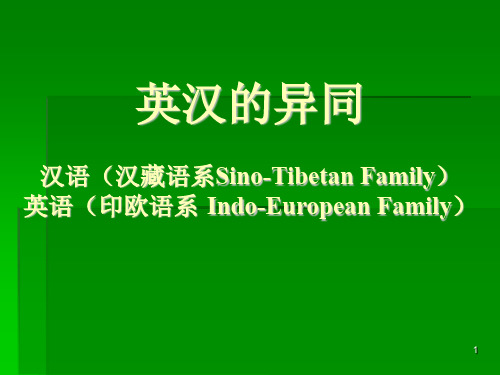
1)英大于汉:指一个英语词语可以对应多个 汉语词语。如:
marry thick
thin
嫁、娶 厚、稠、粗 薄、稀、细
brother
cle
哥哥,弟弟 夫
叔、伯、舅、姑父、姨
cousin
表兄、表弟、表姐、表妹、堂兄、堂弟、堂姐、
堂妹
4
在英译汉的过程中,应根据具体语境来判断 英语词语的确切含义。
you, Colonel; but I bare no malice(恶意; 怨恨). I should have done the same myself. I’ve been the victim of one woman after another all of life…
上校,你真鬼,可是咱不怪你;要是咱,咱 也这么办。咱一辈子总是吃娘们的亏,…
社会主义 上海
二氧化碳
socialism Shanghai carbon dioxide
3
2、部分对应(partial equivalence)
由于人们对客观事物的命名和概念划分方式不 尽相同,无论是在英文还是在汉语中,都存在 一词多义现象。所谓英汉词汇的对应,绝大多 数是部分义项的对应。
9
2)英有汉无
一些英语国家特有的语言文化现象在汉语中也找 不到对应的表达方式,这就造成了英有汉无的词
汇空缺现象。例如二十世纪初,西方的一些先进
理念刚刚传入中国,出现了一些新词,如 science, democracy,都是汉语中所没有的,最 初人们只好音译为“赛因斯”和“德莫克拉西”,
后来随着社会的发展,它们才逐渐翻译成“科学” 和“民主”。再如:
“吃饭了没有?”
Have you had breakfast/lunch/supper?
英汉语言对比-PPT课件
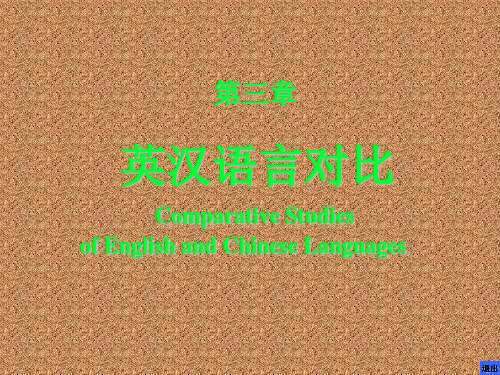
12 返回章重点 退出
3. 1. 3 英语爱用静态词,汉语常用动态词 英语在表达意义时,喜欢使用静态词汇, 如名词(抽象名词)、介词短语、形容词、副 词以及表示状态的弱式动词(be, have, become, grow, feel, go, come, get, do等)和虚 化动词(have a look, take a walk, pay a visit, do shopping, do some reading等)来表示动作 意义;而汉语则多使用动态词汇,英译汉时常 常把原文中表示动作意义的静态叙述转换成汉 语的动态叙述。
A. 科学是人类的仆人。 B. 科学是人类的工具。 C. 科学服务于人类。 D. 科学造福于人类。
【解析】答案D. “servant”意为“仆人,奴隶,工具”,
可理解为“服务”“造福”,科学可改变人类,优 化环境,丰富生活,给人类带来许多好处,“ 造福 于人类”。
21
返回章重点 退出
例5:In an odd way the two leaders diminished each other.
课堂互动3
3. 4 英汉句意表达对比
3.4.1 3.4.2 3.4.3 3.4.4 英汉都有增补与省略 英汉都有词类转换 英汉都有巧妙重复 英汉都受上下文制约选择词义
课堂互动4 1.词句表达 2.语序调整 3.衔接表达
第三章综合练习及参考答案
--end
退出
第三章
英汉语言对比
Comparative Studies of English and Chinese Languages
9 返回章重点 退出
Comparisons between English and Chinese Language Features
3. 1. 3 英语爱用静态词,汉语常用动态词 英语在表达意义时,喜欢使用静态词汇, 如名词(抽象名词)、介词短语、形容词、副 词以及表示状态的弱式动词(be, have, become, grow, feel, go, come, get, do等)和虚 化动词(have a look, take a walk, pay a visit, do shopping, do some reading等)来表示动作 意义;而汉语则多使用动态词汇,英译汉时常 常把原文中表示动作意义的静态叙述转换成汉 语的动态叙述。
A. 科学是人类的仆人。 B. 科学是人类的工具。 C. 科学服务于人类。 D. 科学造福于人类。
【解析】答案D. “servant”意为“仆人,奴隶,工具”,
可理解为“服务”“造福”,科学可改变人类,优 化环境,丰富生活,给人类带来许多好处,“ 造福 于人类”。
21
返回章重点 退出
例5:In an odd way the two leaders diminished each other.
课堂互动3
3. 4 英汉句意表达对比
3.4.1 3.4.2 3.4.3 3.4.4 英汉都有增补与省略 英汉都有词类转换 英汉都有巧妙重复 英汉都受上下文制约选择词义
课堂互动4 1.词句表达 2.语序调整 3.衔接表达
第三章综合练习及参考答案
--end
退出
第三章
英汉语言对比
Comparative Studies of English and Chinese Languages
9 返回章重点 退出
Comparisons between English and Chinese Language Features
英汉语言对比(精编课件).ppt

例子: (1)A: I’ll have a cup of black coffee with sugar, please.
B: Give me the same, please.(语法功能性名词替代) 译文: A:劳驾,我要一杯加糖的清咖啡。 B:请给我也来一杯。(词汇衔接中的重复)
(2)A:Do you think he was too serious? B: Yes, I think so.(替代一个完整的陈述分句)
精品课件
重分析
她们或许是我们的奶奶,满头银丝,满脸皱纹,世人多用“慈 祥”去形容她们,但很少有人能品味皱纹背后那岁月与历史 浮过的幽香。她们无须再用铅华刻意雕饰,我却分明看见她 和她的老伴共同演出那首动人的歌—《牵手》。 眼泪是上苍对一切感情动物的馈赠,爱为心之声,泪因爱而凝, 留泪是女人爱的宣泄,情的倾诉,女人流泪时最美。 (“女人什么时候最美”《英语沙龙》1999/8,19)
together , they have no water to drink. • 分析: • 交替性同构只在第1、2句,第3句主要靠词汇重复和指称实现衔接。而they have no
water to drink一句虽仍与前两句同构,但其衔接作用已大大降低了。
精品课件
2. 词汇连接的差异
•词汇连接指的是语篇中出现的一部分词汇相互之间存在语义 上的联系,或重复,或由其他词语替代,或共同出现。据此, 应明确把词汇语义的重复、组合搭配和种种关系统称为语义 的重复同现,并把各种指称关系(属于语义上的同一性的前 后照应和上下指等)归入词汇连接。在此基础上,下面就从 语义的重复同现(词汇语义的重复、组合搭配和相似、分类 等)和指称照应两方面来探讨英汉语篇词汇连接的差异。
语言的连贯与其语言特色往往是同一语言的两面。
B: Give me the same, please.(语法功能性名词替代) 译文: A:劳驾,我要一杯加糖的清咖啡。 B:请给我也来一杯。(词汇衔接中的重复)
(2)A:Do you think he was too serious? B: Yes, I think so.(替代一个完整的陈述分句)
精品课件
重分析
她们或许是我们的奶奶,满头银丝,满脸皱纹,世人多用“慈 祥”去形容她们,但很少有人能品味皱纹背后那岁月与历史 浮过的幽香。她们无须再用铅华刻意雕饰,我却分明看见她 和她的老伴共同演出那首动人的歌—《牵手》。 眼泪是上苍对一切感情动物的馈赠,爱为心之声,泪因爱而凝, 留泪是女人爱的宣泄,情的倾诉,女人流泪时最美。 (“女人什么时候最美”《英语沙龙》1999/8,19)
together , they have no water to drink. • 分析: • 交替性同构只在第1、2句,第3句主要靠词汇重复和指称实现衔接。而they have no
water to drink一句虽仍与前两句同构,但其衔接作用已大大降低了。
精品课件
2. 词汇连接的差异
•词汇连接指的是语篇中出现的一部分词汇相互之间存在语义 上的联系,或重复,或由其他词语替代,或共同出现。据此, 应明确把词汇语义的重复、组合搭配和种种关系统称为语义 的重复同现,并把各种指称关系(属于语义上的同一性的前 后照应和上下指等)归入词汇连接。在此基础上,下面就从 语义的重复同现(词汇语义的重复、组合搭配和相似、分类 等)和指称照应两方面来探讨英汉语篇词汇连接的差异。
语言的连贯与其语言特色往往是同一语言的两面。
《英汉语言对比》课件

英语段落结构特点:注重逻辑性和连贯性,段落结构清晰,易于理解。
汉语段落结构特点:注重情感表达和意境营造,段落结构灵活多变,富有诗意。
篇章连贯性对比
英语篇章结构: 注重逻辑性和连 贯性,通常采用 总分总的结构
汉语篇章结构: 注重情感表达和 意境营造,通常 采用起承转合的 结构
英语篇章连贯性: 通过连接词、代 词、同义词等手 段实现篇章连贯
汉语主谓结构特点:主 语在前,谓语在后,如 "我是学生"
英语主谓结构变化:主 语可以省略,如"It is raining"
汉语主谓结构变化:主 语可以省略,如"下雨 了"
句型结构对比
英语句子 结构:主 语+谓语 +宾语
汉语句子 结构:主 语+谓语 +宾语
英语句子 结构:主 语+谓语 +宾语+ 补语
YOUR LOGO
英汉语言对比
汇报人:
,
汇报时间:20X-XX-XX
添加目录标题 句子结构对比
英汉语言概述 篇章结构对比
词汇层面对比 修辞手法对比
单击添加章节标题
英汉语言概述
英语语言特点
英语是一 种拼音文 字,由26 个字母组 成
英语单词 由字母组 成,每个 单词都有 一定的含 义
英语语法 结构严谨, 有主语、 谓语、宾 语等成分
英汉礼貌语与委婉语的对比
礼貌语:英语中常用Please、Thank you等表达礼貌,汉语中常用“请”、 “谢谢”等表达礼貌。 委婉语:英语中常用Could you、Would you等表达委婉,汉语中常用 “能否”、“能否麻烦”等表达委婉。
礼貌用语的差异:英语中礼貌用语较为直接,汉语中礼貌用语较为含蓄。
汉语段落结构特点:注重情感表达和意境营造,段落结构灵活多变,富有诗意。
篇章连贯性对比
英语篇章结构: 注重逻辑性和连 贯性,通常采用 总分总的结构
汉语篇章结构: 注重情感表达和 意境营造,通常 采用起承转合的 结构
英语篇章连贯性: 通过连接词、代 词、同义词等手 段实现篇章连贯
汉语主谓结构特点:主 语在前,谓语在后,如 "我是学生"
英语主谓结构变化:主 语可以省略,如"It is raining"
汉语主谓结构变化:主 语可以省略,如"下雨 了"
句型结构对比
英语句子 结构:主 语+谓语 +宾语
汉语句子 结构:主 语+谓语 +宾语
英语句子 结构:主 语+谓语 +宾语+ 补语
YOUR LOGO
英汉语言对比
汇报人:
,
汇报时间:20X-XX-XX
添加目录标题 句子结构对比
英汉语言概述 篇章结构对比
词汇层面对比 修辞手法对比
单击添加章节标题
英汉语言概述
英语语言特点
英语是一 种拼音文 字,由26 个字母组 成
英语单词 由字母组 成,每个 单词都有 一定的含 义
英语语法 结构严谨, 有主语、 谓语、宾 语等成分
英汉礼貌语与委婉语的对比
礼貌语:英语中常用Please、Thank you等表达礼貌,汉语中常用“请”、 “谢谢”等表达礼貌。 委婉语:英语中常用Could you、Would you等表达委婉,汉语中常用 “能否”、“能否麻烦”等表达委婉。
礼貌用语的差异:英语中礼貌用语较为直接,汉语中礼貌用语较为含蓄。
英汉语言的对比(课堂PPT)
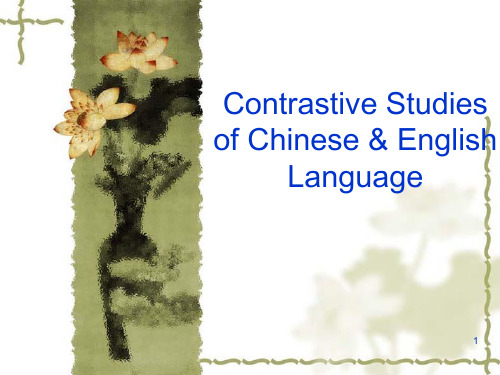
Contrastive Studies of Chinese & English
Language
1
❖ As you know, our native language Chinese is quite different from English. There is really a big gap between the characteristics of the two languages.
9
Semantic Comparison of Chinese and English (詞義對比)
❖ A. The meanings of the word (詞的意義方面): ❖ 1、英語中有些詞所表示的意義,在漢語裡可以找到完
全對應的詞來表達。(semantic correspondence) ❖ 專用名詞、術語和事物名稱 。 ❖ The U.S. State Department (美國國務院); ❖ 薩斯SARS(Severe Acute Respiratory Syndrome); ❖ Aids (Acquired Immune Deficiency Syndrome) ; ❖ 直升飛機;太平洋
2
Language Families ( 語系)
❖ English belongs to the Germanic branch of the Indo-European language family (印歐語系).
❖ Chinese belongs to the Sino-Tibetan language family (漢藏語系).
5
❖ English:
❖ Composition: motherland, blackboard, handwriting, silkworm, easy-going, home-made, do-it-yourself
Language
1
❖ As you know, our native language Chinese is quite different from English. There is really a big gap between the characteristics of the two languages.
9
Semantic Comparison of Chinese and English (詞義對比)
❖ A. The meanings of the word (詞的意義方面): ❖ 1、英語中有些詞所表示的意義,在漢語裡可以找到完
全對應的詞來表達。(semantic correspondence) ❖ 專用名詞、術語和事物名稱 。 ❖ The U.S. State Department (美國國務院); ❖ 薩斯SARS(Severe Acute Respiratory Syndrome); ❖ Aids (Acquired Immune Deficiency Syndrome) ; ❖ 直升飛機;太平洋
2
Language Families ( 語系)
❖ English belongs to the Germanic branch of the Indo-European language family (印歐語系).
❖ Chinese belongs to the Sino-Tibetan language family (漢藏語系).
5
❖ English:
❖ Composition: motherland, blackboard, handwriting, silkworm, easy-going, home-made, do-it-yourself
第三章英汉语言现象对比ppt课件
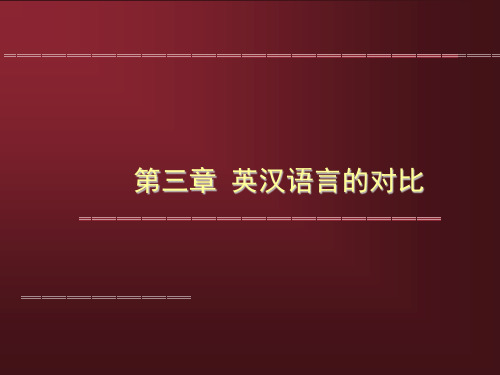
议员院)议员(男议员或女议员)
11
D. 交叉对应。
• light music 轻音乐(light=intended chiefly to entertain • light loss 轻微的损失(light=not heavy); • light heart 轻松的心情(light=relaxed) • light car 轻便汽车(light=having little weight); • light step 轻快的步伐(light=gentle) • light manners 轻浮的举止(light=frivolous); • light outfit 轻巧的设备(light=handy) • light work 轻松的工作(light=requiring little effort) • light voice 轻柔的声音(light= soft)
序,译成汉语时却不符合汉语习惯,须 作颠倒处理
• rural America 美国农村;a new international economic order 国际经济新秩序
18
2
第二节
英汉句法现象的对比
19
一、英汉句子对比
• 例如: • His idea is that we clean the
(formal) • John went to bed early because he felt
tired. (common core) • John felt tired, so he went to bed early.
(informal)
24
二、英语句子翻译
• 一、亦步亦趋 • 二、化整为零(分译) • 三、调整句序、词序
• .他喜欢我那热情欢快的妹妹。 • (定语分句--前置定语)
11
D. 交叉对应。
• light music 轻音乐(light=intended chiefly to entertain • light loss 轻微的损失(light=not heavy); • light heart 轻松的心情(light=relaxed) • light car 轻便汽车(light=having little weight); • light step 轻快的步伐(light=gentle) • light manners 轻浮的举止(light=frivolous); • light outfit 轻巧的设备(light=handy) • light work 轻松的工作(light=requiring little effort) • light voice 轻柔的声音(light= soft)
序,译成汉语时却不符合汉语习惯,须 作颠倒处理
• rural America 美国农村;a new international economic order 国际经济新秩序
18
2
第二节
英汉句法现象的对比
19
一、英汉句子对比
• 例如: • His idea is that we clean the
(formal) • John went to bed early because he felt
tired. (common core) • John felt tired, so he went to bed early.
(informal)
24
二、英语句子翻译
• 一、亦步亦趋 • 二、化整为零(分译) • 三、调整句序、词序
• .他喜欢我那热情欢快的妹妹。 • (定语分句--前置定语)
英汉语言对比PPT课件
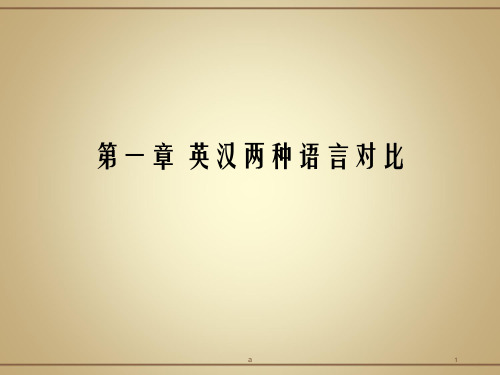
A. English words without Chinese equivalents dollar saint beddo(一种多用途的床,电子床)
B. Chinese words without English equivalents
党员,人民公社,居委会,街道办
a
16
E.g. Different meanings of the word “story”:
那个官员拒绝证实这个消息。
7). Some reporters who were not included in the session broke the story.
有些那次会议没有到场的记者把内情揭露出来 。
a
18
“A. 英汉语言基本相同的搭配
Soft pillow, soft cushion, Soft wood, soft light, soft voice, soft breeze ,
Soft answer Soft drink
Soft heart Soft words Soft money
Soft music
a
19
The record has been considered soft ever
since it was set last May.
Marijuana is usually regarded as a soft
a
7
II. 英汉构词比较
The major ways of word-building in English are composition合成法, conversion转换法, and derivation 派 生法 (affixation). And in Chinese we have the same major ways. English:
英汉语言对比-PPT课件

4 返回章重点 退出
我们在翻译过程中就应该尽量平等地转达这些文化
的方方面面,逐步使译文读者了解原文的文化背景。
尽量保留其语言的比喻形象、语言特点,给读者一
个忠实可信的译文。
5
返回章重点 退出
吕叔湘先生曾说过,“要认识汉语的特点,
就要跟非汉语比较,要认识现代汉语的特点,
就要跟古代汉语比较;要认识普通话特点,就
第三章
英汉语言对比
Comparative Studies of English and Chinese Languages
退出
第三章 英汉语言对比
3. 1 英汉语言特征对比
3.1.1 3.1.2 3.1.3 3.1.4 3.1.5 英语重形合,汉语重意合 英语爱化零为整,汉语喜化整为零 英语爱用静态词,汉语多用动态词 英语语序变换多,汉语结构较固定 英语多用被动,汉语常用主动
要跟方言比较。无论语音、语汇、语法,都可
以通过对比来研以期准确地把
握英语的语言特点及精神风貌,尽量把这种 “特点”和“风貌”真实地反映到汉语译文中。
6
返回章重点 退出
翻译是两种语际间的转换、是两种文化信
息间的转换。语言不是静止不变的,是随着社
课堂互动1
第 三 章 重 点
3. 2 英汉词汇表达对比
3.2.1 英语词汇含义多 3.2.2 英语词汇搭配多 3.2.3 英语词汇在句中的位置多
课堂互动2
3. 3 英汉句法结构对比
3.3.1 英汉句子结构的互换 A. 英语简单句可转换成汉语复合句 B. 英语并列句、复合句可转换成汉语简单句 3.3.2 英汉句子顺序的调整 A.调整时间顺序 B.调整空间顺序 C.调整逻辑顺序
会实践的不断发展而发展的。词的意义、语言 表达也是如此。语言是活的,运用语言的人也 要灵活对待它。“实践,认识,再实践,再认 识,这种形式,循环往复以至无穷,而实践和
我们在翻译过程中就应该尽量平等地转达这些文化
的方方面面,逐步使译文读者了解原文的文化背景。
尽量保留其语言的比喻形象、语言特点,给读者一
个忠实可信的译文。
5
返回章重点 退出
吕叔湘先生曾说过,“要认识汉语的特点,
就要跟非汉语比较,要认识现代汉语的特点,
就要跟古代汉语比较;要认识普通话特点,就
第三章
英汉语言对比
Comparative Studies of English and Chinese Languages
退出
第三章 英汉语言对比
3. 1 英汉语言特征对比
3.1.1 3.1.2 3.1.3 3.1.4 3.1.5 英语重形合,汉语重意合 英语爱化零为整,汉语喜化整为零 英语爱用静态词,汉语多用动态词 英语语序变换多,汉语结构较固定 英语多用被动,汉语常用主动
要跟方言比较。无论语音、语汇、语法,都可
以通过对比来研以期准确地把
握英语的语言特点及精神风貌,尽量把这种 “特点”和“风貌”真实地反映到汉语译文中。
6
返回章重点 退出
翻译是两种语际间的转换、是两种文化信
息间的转换。语言不是静止不变的,是随着社
课堂互动1
第 三 章 重 点
3. 2 英汉词汇表达对比
3.2.1 英语词汇含义多 3.2.2 英语词汇搭配多 3.2.3 英语词汇在句中的位置多
课堂互动2
3. 3 英汉句法结构对比
3.3.1 英汉句子结构的互换 A. 英语简单句可转换成汉语复合句 B. 英语并列句、复合句可转换成汉语简单句 3.3.2 英汉句子顺序的调整 A.调整时间顺序 B.调整空间顺序 C.调整逻辑顺序
会实践的不断发展而发展的。词的意义、语言 表达也是如此。语言是活的,运用语言的人也 要灵活对待它。“实践,认识,再实践,再认 识,这种形式,循环往复以至无穷,而实践和
英汉对比PPT课件

第7页/共44页
• 严格说来,汉语没有形态变化。汉语的数量助词(如“们” 表示复数)、动态助词(如“着”、“了”、“过”表示动 词的体)与结构助词(如“的”、“地”、“得”表示定语、 状语与补语),虽类似英语的形态变化,但这些成分的使用 在汉语里常常缺乏普遍性:有的场合一定要用,有的场合可 用可不用,有的场合甚至不能用。英语形态变化的使用却有 严格的规则,往往带有强制性。
借助虚词改变词序汉语没有发达的形态变化组合语句主要借助词序和虚英语表达语法意义的三大手段有严格的规范有时虽可根据表达的需要选择某种手段但一般都有强制性如在什么情况下该用词形变化用词的何种形式如ed或ing在什么情况下该用虚词用什么虚词如to或for如此等等都有一定的规则随意违反这些规则往往不符合表达规范
• 综合语与分析语(Synthetic vs. Analytic) • 形合与意合(Hypotactic vs. Paratactic) • 物称与人称(Impersonal vs. Personal) • 被动与主动(Passive vs. Active) • 静态与动态(Stative vs. Dynamic) • 抽象与具体(Abstract vs. Concrete)
英语通过词形变化,改变词性,用这些词灵活组句,可 以表达一个几乎相同的意思;汉语没有词形变化,就难 以用这么多的句式来表达同样的意思。英汉互译时,往 往要改变词性、转换词类,才能通顺地表达原意。
第4页/共44页
2.构形形态: 表达语法意义的词形变化。如:
我给他一本书。I gave him a book. 他已给我两本书。He has given me two books. 他爸爸常常给他一些书。His father often gives him books. 汉语的“我”、“他”没有形式变化,同一个词可以表示主格、宾 格或所有格;“书”没有形式变化,可以表示单数或复数;动词 “给”也没有形式变化,可以表示现在、过去或已完成的行为。但 英语对应的词I, me, he, him, his, book, books, gives, gave, has give 却有形式变化。这类变化,往往是英语初学者首先遇到的难点之一。
• 严格说来,汉语没有形态变化。汉语的数量助词(如“们” 表示复数)、动态助词(如“着”、“了”、“过”表示动 词的体)与结构助词(如“的”、“地”、“得”表示定语、 状语与补语),虽类似英语的形态变化,但这些成分的使用 在汉语里常常缺乏普遍性:有的场合一定要用,有的场合可 用可不用,有的场合甚至不能用。英语形态变化的使用却有 严格的规则,往往带有强制性。
借助虚词改变词序汉语没有发达的形态变化组合语句主要借助词序和虚英语表达语法意义的三大手段有严格的规范有时虽可根据表达的需要选择某种手段但一般都有强制性如在什么情况下该用词形变化用词的何种形式如ed或ing在什么情况下该用虚词用什么虚词如to或for如此等等都有一定的规则随意违反这些规则往往不符合表达规范
• 综合语与分析语(Synthetic vs. Analytic) • 形合与意合(Hypotactic vs. Paratactic) • 物称与人称(Impersonal vs. Personal) • 被动与主动(Passive vs. Active) • 静态与动态(Stative vs. Dynamic) • 抽象与具体(Abstract vs. Concrete)
英语通过词形变化,改变词性,用这些词灵活组句,可 以表达一个几乎相同的意思;汉语没有词形变化,就难 以用这么多的句式来表达同样的意思。英汉互译时,往 往要改变词性、转换词类,才能通顺地表达原意。
第4页/共44页
2.构形形态: 表达语法意义的词形变化。如:
我给他一本书。I gave him a book. 他已给我两本书。He has given me two books. 他爸爸常常给他一些书。His father often gives him books. 汉语的“我”、“他”没有形式变化,同一个词可以表示主格、宾 格或所有格;“书”没有形式变化,可以表示单数或复数;动词 “给”也没有形式变化,可以表示现在、过去或已完成的行为。但 英语对应的词I, me, he, him, his, book, books, gives, gave, has give 却有形式变化。这类变化,往往是英语初学者首先遇到的难点之一。
【全版】英汉比较(英汉十大结构性差异)推荐PPT
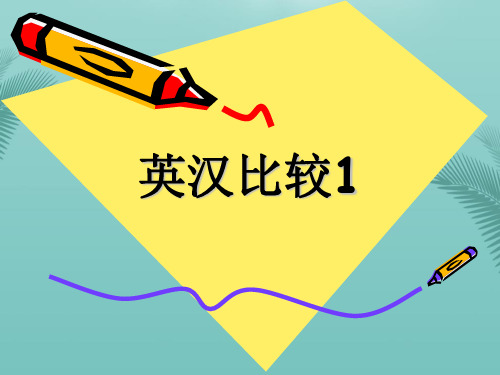
examination and answered every one of them correctly.
The thick carpet killed the sound of my footsteps.
我走在厚厚的地毯上,一点脚步声也没有。
Very soon he was surrounded by a crowd and was snowed under with questions.
英语多用非人称词类作主语;
kindly
and
gentle
nature
could not but revolt at her friend’s 我的小弟弟比我教得好。
The thick carpet killed the sound of my footsteps.
callous behavior. 英语句子讲究长而复杂;
一群人立刻把他围住了,向他提出一个又一个问题。
Ignorance is the mother of fear as well as of admiration. 无知是恐惧的根源,也是倾慕的根源。
Exercise 2
I had experienced oxygen and/or engine trouble.
all power of utterance. 我兴奋得说不出话来。
6.被动与主动 passive vs. active
英语好用被动语态;汉语多用主动结构(包括 主动句和自动句)。
e.g. Diplomatic relations have been
established between China and the United States of America.
always reminds me of my A great number of graduate students were driven into the intellectual slum when in the United States the intellectual poor became the
The thick carpet killed the sound of my footsteps.
我走在厚厚的地毯上,一点脚步声也没有。
Very soon he was surrounded by a crowd and was snowed under with questions.
英语多用非人称词类作主语;
kindly
and
gentle
nature
could not but revolt at her friend’s 我的小弟弟比我教得好。
The thick carpet killed the sound of my footsteps.
callous behavior. 英语句子讲究长而复杂;
一群人立刻把他围住了,向他提出一个又一个问题。
Ignorance is the mother of fear as well as of admiration. 无知是恐惧的根源,也是倾慕的根源。
Exercise 2
I had experienced oxygen and/or engine trouble.
all power of utterance. 我兴奋得说不出话来。
6.被动与主动 passive vs. active
英语好用被动语态;汉语多用主动结构(包括 主动句和自动句)。
e.g. Diplomatic relations have been
established between China and the United States of America.
always reminds me of my A great number of graduate students were driven into the intellectual slum when in the United States the intellectual poor became the
英汉语言对比全套ppt课件
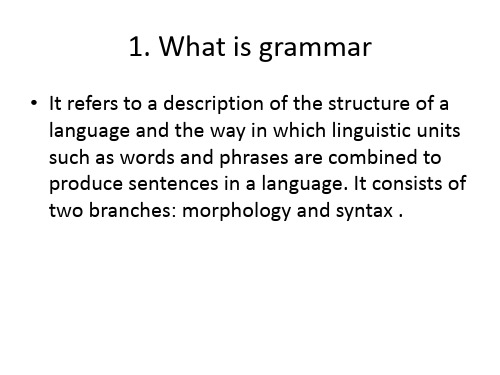
• E. I wish that he could come.
• 2) mood of advice, permission, necessity, guessing, possibility, prediction, request, condition and oblige is expressed by using the modal verbs like may, might, can, could, should, would, must, ought to…….eg.
• A. The hunters have been lost for days. They could starve!
• B. May I have a look at your pictures? • C. When going by airplane, you should arrive at
2. Mood in Chinese
• In Chinese, emotional particles like “啦”,”吧”, “呀”, “啊”, “嘛”, “呢”, “哪”plus intonation are used to express different kinds of mood.
the airport at least one hour earlier. • D. A man landed on Mars? You must be joking.
That can’t be true. • Imperative mood often indicates commands. Eg. • Look out when crossing the street. • Read out loud please.
• 2) mood of advice, permission, necessity, guessing, possibility, prediction, request, condition and oblige is expressed by using the modal verbs like may, might, can, could, should, would, must, ought to…….eg.
• A. The hunters have been lost for days. They could starve!
• B. May I have a look at your pictures? • C. When going by airplane, you should arrive at
2. Mood in Chinese
• In Chinese, emotional particles like “啦”,”吧”, “呀”, “啊”, “嘛”, “呢”, “哪”plus intonation are used to express different kinds of mood.
the airport at least one hour earlier. • D. A man landed on Mars? You must be joking.
That can’t be true. • Imperative mood often indicates commands. Eg. • Look out when crossing the street. • Read out loud please.
- 1、下载文档前请自行甄别文档内容的完整性,平台不提供额外的编辑、内容补充、找答案等附加服务。
- 2、"仅部分预览"的文档,不可在线预览部分如存在完整性等问题,可反馈申请退款(可完整预览的文档不适用该条件!)。
- 3、如文档侵犯您的权益,请联系客服反馈,我们会尽快为您处理(人工客服工作时间:9:00-18:30)。
• As Chinese does not have the grammatical
category of tense, the temporal notions
indicated by English tenses are lexicalized in
Chinese. The lexical words used are mainly adverbs like 那时,昨天,上周,去年,etc., sometimes together with 曾经,过etc. to indicate the past tense; 明天,下周,明年, 要etc. to indicate future tense; 已经,一直 etc. to signal perfect tense. For example:
5. Mood in English and Chinese
• Mood in English • 1) subjunctive mood suggesting doubt,
condition, or a situation contrary to the fact is realized by resorting to auxiliaries with the conjugation of verbs in sentences. Eg. • A. if I were you, I would apply for the job. • B. If I had finished my homework earlier, I would have gone with you to the theatre.
• Derivational morphology is concerned with morphological variations a means of wordbuilding.
2.Morphological contrastive study
• Contrastive analysis on the level of inflectional morphology is largely a matter of constrasting the devices different languages employ to transmit grammatical meanings. These devices are usually known as “grammatical categories”, which include aspect, tense, case, gender, mood, person, class of word(parts of speech)
• Actor
actress
• Waiter waitress
• Host
hostess
• Hero
heroine
• While in Chinese, there is no such suffix to denote gender. Often the prefix ‘男’or ‘女’ is added to show masculine or feminine.
• I’m going to go shopping. • (5)他明早会演奏这支曲子。
• He will be playing the tone tomorrow morning. • (6)他已经得了三次一等奖。
• He has already won the first prize for three times. • (7)五岁以来,他一直在学钢琴。
• E. I wish that he could come.
• 2) mood of advice, permission, necessity, guessing, possibility, prediction, request, condition and oblige is expressed by using the modal verbs like may, might, can, could, should, would, must, ought to…….eg.
• A. The hunters have been lost for days. They could starve!
• B. May I have a look at your pictures? • C. When going by airplane, you should arrive at
• Morphology comprises two parts: inflectional morphology and derivational morphology.
• Inflectional morphology is concerned with morphological variations that result from grammatical needs.
• He has been learning piano since she was five.
3. Case in Eere are nominative case like I, we, you, he, they, objective case like me, us, you, her, him, and possessive case like my, our, your, her, his and their and nominal pronoun like mine, ours, yours, hers, his, and theirs. While in Chinese, there is no such inflection of case pronoun. It is the word order that determines if a noun or noun phrases is the nominative case or the objective case or possessive case. Eg.:
4. Gender in English and Chinese
• Generally speaking, both English and Chinese don’t have word inflections indicating particular masculine or feminine of a thing. However, a few English words can be used as a specific reference to a masculine or a feminine. Eg.
• (1) 那时他正要锁门。
• He was going to lock the door then. • (2)她昨天买了一辆车。
• She bought the car yesterday. • (3)John曾经因违章停车被罚过100美元。
• John was once fined 100 dollars for misplacing his car. • (4)我要去买东西。
• 1)啦 • 他早回来了!
• He came back much earlier today. • 他不来啦?
• He didn’t come, did he?
1) Aspect in English and Chinese
• In English the aspectual meaning is realized by resorting to auxiliary words and verb conjugation. Eg.
• They are watching TV now.(progressive) • He has finished his homework. (perfect) • While in Chinese, there are some particles like
• C. it’s important (necessary, strange, impossible) that sb. should do sth.
• D. he suggests (orders, recommends, requires, insists) that sb. should do sth.
the airport at least one hour earlier. • D. A man landed on Mars? You must be joking.
That can’t be true. • Imperative mood often indicates commands. Eg. • Look out when crossing the street. • Read out loud please.
Contrastive study between Chinese and English in Grammar
1. What is grammar
• It refers to a description of the structure of a language and the way in which linguistic units such as words and phrases are combined to produce sentences in a language. It consists of two branches: morphology and syntax .
• In English, tenses, like aspect, are realized by resorting to auxiliary words and verb conjugation. When aspects combine with tense, eg. When progressive combines with tense, the past progressive, present progressive and future progressive result.
